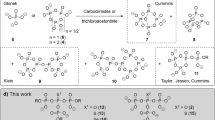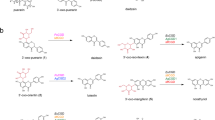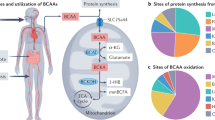Abstract
IN Fig. 1 are seen on the right the melting points and the tolerated amounts of alkylated succinic acids ; on the left the behaviour of β-alkyl-adipic acids plotted in the same manner. Both pairs of curves demonstrate a curious concordance between the purely physical attributes of melting point and the biological behaviour in the dog. We have also studied the properties of acids with longer side-chains, but have not plotted these values in the figures. The curves differ more as the number of carbon atoms in the side-chains increases, the melting points ascending more slowly than the tolerated amounts. The concordance of the curves, we conclude, is connected with the steric hindrance of the short side-chain, which renders the growth of crystals more difficult, as well as the apposition to oxidative enzymes.
This is a preview of subscription content, access via your institution
Access options
Subscribe to this journal
Receive 51 print issues and online access
$199.00 per year
only $3.90 per issue
Buy this article
- Purchase on Springer Link
- Instant access to full article PDF
Prices may be subject to local taxes which are calculated during checkout
Similar content being viewed by others
Author information
Authors and Affiliations
Rights and permissions
About this article
Cite this article
WEITZEL, G., FRETZDORFF, A., WOJAHN, J. et al. Properties of Branched Aliphatic Acids and their Behaviour in the Dog. Nature 163, 406–407 (1949). https://doi.org/10.1038/163406a0
Issue Date:
DOI: https://doi.org/10.1038/163406a0
This article is cited by
-
Ist die Verwendung synthetischer Fetts�uren f�r Speisezwecke gef�hrlich?
Klinische Wochenschrift (1950)
-
Untersuchungen an einfach methylierten Stearins�uren
Die Naturwissenschaften (1950)
-
Ist die ver Wendung Synthetischer Fetts�uren F�r Speisezwecke Ungef�hrlich?
Klinische Wochenschrift (1949)
Comments
By submitting a comment you agree to abide by our Terms and Community Guidelines. If you find something abusive or that does not comply with our terms or guidelines please flag it as inappropriate.



